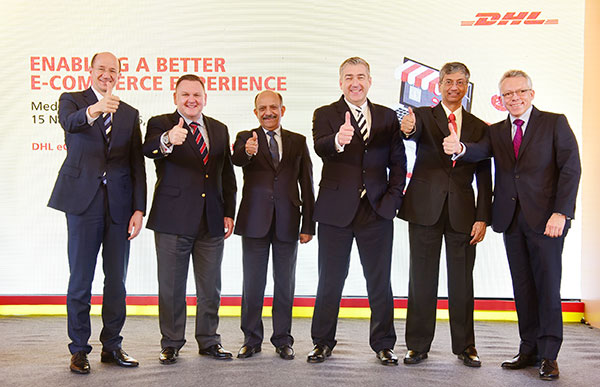Logistics giant sets eye on Asia Pacific
 |
Malcolm Monteiro, CEO of DHL eCommerce Asia Pacific, told VIR that Vietnam is particularly important amongst the firm’s Southeast Asian markets due to the huge opportunities it offers. DHL eCommerce is studying the 90-million market and meeting with the most promising e-commerce companies in Vietnam.
“Our entire objective is to work closely with Vietnamese people by adapting global expertise to the local market. Thus, we are doing an extensive market study before launching our products in Vietnam,” he noted.
Meanwhile, InDo Trans Logistics Corporation (ITL Corp) has just officially announced joining the Vietnamese courier market under the brand SpeedLink, focusing on e-commerce logistics services, which is considered to hold more potential than general logistics services.
Lazada, Southeast Asia's largest online shopping website, also has its own delivery company called LEX.
Lazada Vietnam’s CEO Alexandre Dardy told VIR that the e-commerce concept was still unknown when Lazada launched in Vietnam five years ago. During this time, warehouse and delivery services were undeveloped to effectively serve e-commerce. However, e-commerce is now developing hand-in-hand with delivery services. Many delivery parties have entered the market and we now have much better choices.
Vietnam Post’s competency is its distribution network covering even the most remote areas. On the other hand, Giaohangnhanh and other young delivery parties have a deep understanding of e-commerce, higher-level technology application, are fast to adapt, and similar system development with new e-commerce sites. Meanwhile, Ninja Van has advantages when it comes to large-size orders that require customised trucks.
“Delivery services are forecast to develop even more with investments from current players to enhance their facilities, technique, and network, while new players, such as Grab and Uber will enter the market with their own competencies to penetrate e-commerce and DHL in the near future, focusing on the domestic market and approaching the current leaders in e-commerce,” he noted.
 |
David and Goliath?
Juergen Gerdes, CEO of Post – eCommerce – Parcel Division at Deutsche Post DHL Group, said that the e-commerce industry is extremely exciting and offers tremendous opportunities for businesses and consumers alike.
The global B2C (cross-border) e-commerce market will multiply in size to $1 trillion in 2020. Thus, DHL eCommerce was launched in 2014 with the aim to capitalise on the growing opportunities in e-commerce logistics.
Most recently, DHL eCommerce has invested EUR70 million ($74.3 million) to strengthen its operations to meet the fast-growing demand for quality e-commerce logistics services in India. This investment is part of the company’s broader plan to aggressively expand across the Asia Pacific.
In June 2016, DHL eCommerce announced increasing its overall presence in China by 50 per cent by expanding its distribution centres in Shenzhen, Shanghai, and Hong Kong. Earlier in January 2016, DHL eCommerce launched domestic delivery operations in Thailand and announced plans to double its fleet and number of depots by 2017.
Charles Brewer, CEO of DHL eCommerce said that this year’s investments in India, the Americas, and the Asia Pacific showcases the corporation’s commitment to the e-commerce industry by delivering high quality and reliable logistics solutions to meet the rising demands of e-commerce consumers.
“The company has recently developed an eco-friendly street scooter and a driverless drone (parcelcopter) for last-mile delivery. As part of our expansion plans, DHL intends to bring these new vehicles to Asia in the coming years,” he said.
According to Le Duy Hiep, chairman of the Vietnam Logistics Association, the entrance of the foreign logistics giant will heat up competition in Vietnamese e-commerce logistics. The main reason is that Vietnamese logistics companies are generally of a smaller scale, like online booking and delivery services, and have no cross-border experience. Most of them also lack technology and capital to scale up its operations.
“The Vietnamese e-commerce market is lagging far beyond its neighbours, like China, where online sales account for $548 billion. To develop the e-commerce logistics sector, the government should introduce action plans, while local companies should join forces to invest in technology infrastructure to prepare for the future,” he noted.
On the same note, Dardy said that Vietnamese e-commerce is developing based on an ecosystem where delivery companies play an important role in supporting each other. This is a win-win relationship that also benefits the market and brings the fastest and most convenient services for customers. Therefore, new comers are encouraged to join and develop the market together.
What the stars mean:
★ Poor ★ ★ Promising ★★★ Good ★★★★ Very good ★★★★★ Exceptional
Latest News
More News
- US firms deepen energy engagement with Vietnam (February 05, 2026 | 17:23)
- Vietnam records solid FDI performance in January (February 05, 2026 | 17:11)
- Site clearance work launched for Dung Quat refinery upgrade (February 04, 2026 | 18:06)
- Masan High-Tech Materials reports profit: a view from Nui Phao mine (February 04, 2026 | 16:13)
- Hermes joins Long Thanh cargo terminal development (February 04, 2026 | 15:59)
- SCG enhances production and distribution in Vietnam (February 04, 2026 | 08:00)
- UNIVACCO strengthens Asia expansion with Vietnam facility (February 03, 2026 | 08:00)
- Cai Mep Ha Port project wins approval with $1.95bn investment (February 02, 2026 | 16:17)
- Repositioning Vietnam in Asia’s manufacturing race (February 02, 2026 | 16:00)
- Manufacturing growth remains solid in early 2026 (February 02, 2026 | 15:28)
















 Mobile Version
Mobile Version